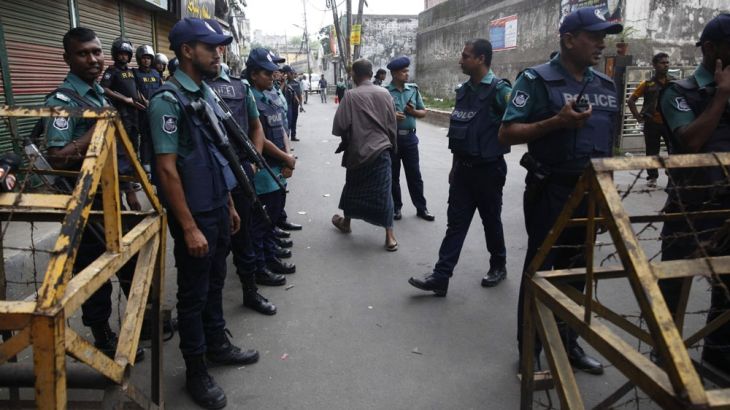Bangladesh sentences 19 to death over Hasina rally attack
A Dhaka court also sentences top opposition leader Tarique Rahman to life imprisonment over 2004 attack on a rally.

Dhaka, Bangladesh – A Dhaka court has handed down death penalty to 19 people, including two former ministers, and sentenced a top opposition leader to life imprisonment over a 2004 attack on the current Prime Minister Sheikh Hasina.
“They shall be hanged by their neck,” said Justice Shahed Nuruddin of the special tribunal, who also awarded life imprisonment to Tarique Rahman, exiled son of former Prime Minister Khaleda Zia.
Zia is already languishing inside a Dhaka jail following her conviction in a corruption case, which came in advance of the country’s general election scheduled to be held by the end of the year.
Rahman, who is the acting chairman of the opposition Bangladesh Nationalist Party (BNP), was jailed for 10 years in absentia in the same corruption case as her mother. He has been living in exile in London since 2008.
Bangladesh’s Law Minister Anisul Haque said the government will move a higher court to seek death penalty for Rahman too.
![The special court awarded life imprisonment to Tarique Rahman [File:Pavel Rahman/AP]](/wp-content/uploads/2018/10/a08b1d8e078341deaa2cb209ebed48c8_6.jpeg)
“We will also take diplomatic steps to bring Tarique back from London,” he said.
The security in and around the special tribunal in the capital, Dhaka, was beefed up anticipating protests from BNP leaders and activists.
Senior BNP leaders, including former State Minister of Home Affairs Lutfuzzaman Babar and former Deputy Minister of Education Abdus Salam Pintu, were given capital punishment for hatching the plot to assassinate Hasina.
The BNP said the conviction was “politically motivated” and the party does not “accept it”.
Mirza Fakhrul Islam Alamgir, the party’s secretary general, said the verdict against its leaders is “just another example of using judiciary for political revenge”.
2004 attack
The “August 21 grenade attack case”, as it is known in Bangladesh, relates to the deadly attack on a rally organised by Hasina’s Awami League (AL) in Dhaka in 2004 when she was the opposition leader.
Hasina narrowly survived the attack after some of her party leaders formed a human shield around her, but up to 20 people were killed, including top AL leader Ivy Rahman.
The case documents said the attack was a “meticulously designed plot” to assassinate Hasina hatched by the BNP.
The BNP and Jamaat-e-Islami coalition government, which was in power at the time of the attack, was accused of scuttling the investigation to protect the masterminds.
After the verdict on Wednesday, Sayed Rezaur Rahman, one of the main prosecutors, said, “The grenade attack is considered one of the most heinous crimes in the country’s history. This is not a politically motivated case, rather a criminal one.”
According to the documents submitted by the prosecution, the attack was carried out by the armed group, Harkat-ul-Jihad (HuJI).
Citing the alleged involvement of Mufti Abdul Hannan, the prosecution also alleged the purpose of the attack was to establish “fanatic Islam” in the south Asian country.
Hannan, a senior HuJI leader accused of multiple attacks in Bangladesh, was executed last year.
The BNP alleges that Hasina is crushing dissent and putting rivals behind bars to strengthen her re-election bid.